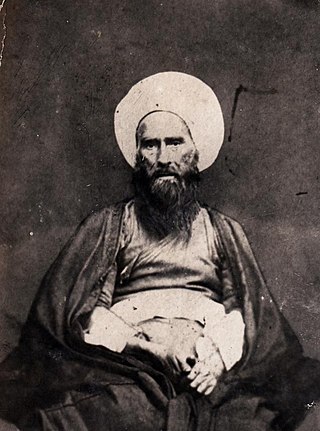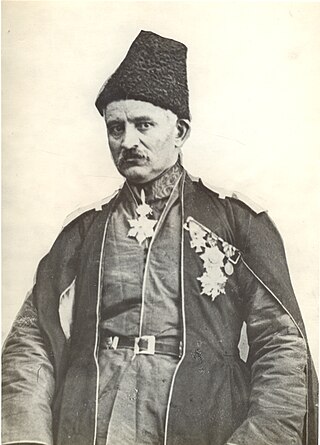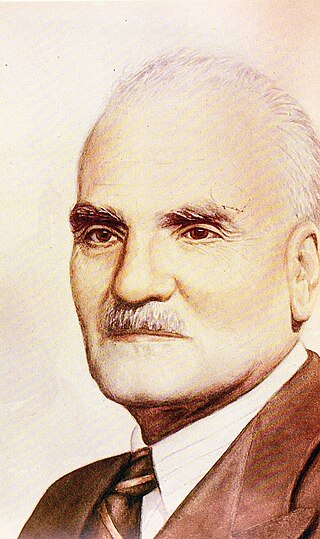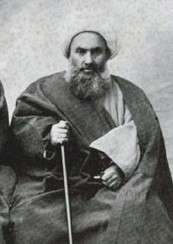Evan Siegel | |
|---|---|
| Born | 1954 (age 68–69) USA? |
| Occupation | Academic |
| Website | https://www.webcitation.org/query?url=http://www.geocities.com/evan_j_siegel/ |
Evan Siegel is a professor of Mathematics and Computer Science.
Evan Siegel received his PhD in Mathematics from the CUNY Graduate Center in 2000, his MSc in Mathematics from New York University, and his BSc in Mathematics from MIT. He is currently an Associate Professor of Mathematics at New Jersey City University. In addition to his interest in Mathematics, Siegel is interested in the history of the Middle East and has numerous publications on this topic. Siegel does research in sources in Persian, French, Arabic, Turkish, Russian, German, and Georgian. [1]
In 1998-2000 he was an Editorial Board Member of the Journal of Azerbaijani Studies, and in 1994-2002 a Corresponding Secretary of the International Society for Azerbaijani Studies.

Nasreddin or Nasreddin Hodja (1208-1285) is a character in the folklore of the Muslim world from the Balkans to China, and a hero of humorous short stories and satirical anecdotes. There are frequent statements about his existence in real life and even archaeological evidence in specific places, for example, a tombstone in the city of Akşehir, Turkey. At the moment, there is no confirmed information or serious grounds to talk about the specific date or place of Nasreddin's birth, so the question of the reality of his existence remains open.
Articles related to the Azerbaijan Republic include:

Ahmad Hokmabadi Tabrizi, later known as Ahmad Kasravi, was a pre-eminent Iranian historian, jurist, linguist, theologian, a staunch secularist and intellectual. He was a professor of law at the University of Tehran, as well as an attorney and judge in Tehran, Iran.

Haji Mirza Hassan Tabrizi, famously known as Hassan Roshdieh, was an Iranian cleric, teacher, politician, and journalist. He introduced some modern teaching methods in Iran, especially in teaching the alphabet. These are still used to some degree in Iran's primary schools.

The Isfahan School is a school of Islamic philosophy. It was founded by Mir Damad and reached its fullest development in the work of Mulla Sadra. The name was coined by Seyyed Hossein Nasr and Henry Corbin.

Hadi Sabzavari or Hajj Molla Hadi Sabzavari was an Iranian philosopher, mystic theologian and poet.

Mirza Fatali Akhundov, also known as Mirza Fatali Akhundzade, or Mirza Fath-Ali Akhundzadeh, was a celebrated Iranian Azerbaijani author, playwright, atheist, philosopher, and founder of Azerbaijani modern literary criticism, "who acquired fame primarily as the writer of European-inspired plays in the Azeri Turkic language".

Sayyed Hasan Taqizādeh was an influential Iranian politician and diplomat, of Azeri origin, during the Qajar dynasty under the reign of Mohammad Ali Shah, as well as the Pahlavi dynasty under the reign of Reza Shah and Mohammad Reza Shah. Taqizadeh was also a prominent scholar; his studies on Iranian calendars remain reference work up until now.

Jalil Huseyngulu oghlu Mammadguluzadeh, was an Azerbaijani satirist and writer. He was the founder of Molla Nasraddin, a satirical magazine that would greatly influence the genre in the Middle East and Central Asia.

Molla Nasraddin was an eight-page Azerbaijani satirical periodical published in Tiflis, Tabriz and Baku (from 1922–33; from the 2nd issue of 1931 the magazine was called: Allahsyz in the Azerbaijani and occasionally Russian languages. The magazine was "read across the Muslim world from Morocco to East Asia". It was founded by Jalil Mammadguluzadeh and Omar Faig Nemanzadeh, and named after Nasreddin, the legendary Sufi wise man-cum-fool of the Middle Ages. Columnists wrote articles that "boldly satirized politics, religion, colonialism, Westernization, and modernization, education, and the oppression of women".

Sheikh Fazlollah bin Abbas Mazindarani, also known as Fazlollah Noori, was a twelver Shia Muslim scholar and politician in Qajar Iran during the late 19th and early 20th century and founder of islamist Shi'ism in Iran. Nouri was a financially successful court official responsible for conducting marriages and contracts, he also handled wills of wealthy men and collected religious funds. As a controversial political figure, his political stance was variable according to the prevailing trends of the royal court.

Mirzā Abdul'Rahim Tālibi Najjār Tabrizi, also known as Talibov, was an Iranian Azerbaijani intellectual and social reformer. He was born in the Sorkhab district of Tabriz, Iran. Both his father, Abu-Tālib Najjār Tabrizi, and grandfather, Ali-Morad Najjār Tabrizi, were carpenters. No information concerning the maternal side of his family is available.

The Persian Constitutional Revolution, also known as the Constitutional Revolution of Iran, took place between 1905 and 1911. The revolution led to the establishment of a parliament in Persia (Iran) during the Qajar dynasty.
The Iranian women participated actively in constitutional, struggles. From the year 1906 women's organizations were formed and many women participated in constitutionalism. But the National Women's Movement was just a minority movement and part of the great national movement of Iran with the goal of the independence of the country and the implementation of the constitution. The participation of women in these political events was spontaneous, with their new nationalist sentiment and willingness to be recognized.

The Iranian Enlightenment, sometimes called the first generation of intellectual movements in Iran, brought new ideas into traditional Iranian society from the mid-nineteenth to the early twentieth century. During the rule of the Qajar dynasty, and especially after the defeat of Iran in its war with the Russian Empire, cultural exchanges led to the formation of new ideas among the educated class of Iran. This military defeat also encouraged the Qajar commanders to overcome Iran's backwardness. The establishment of Dar ul-Fonun, the first modern university in Iran and the arrival of foreign professors, caused the thoughts of European thinkers to enter Iran, followed by the first signs of enlightenment and intellectual movements in Iran.

The siege of Astarabad took place in June 1908 when Mohammad Baqir Khan Salar Akram was commissioned by the authoritarian government of Mohammad Ali Shah to take Astarabad from the constitutionalists. Astarabad was located in a very important strategic region because on the one hand it had access to Russia and on the other hand it was a region with the necessary strength for emergencies. Salar Akram reached the gates of Astarabad in June 1908, a week after the bombing of the parliament with his army, but Sardar Rafi Yansari, Wali of the province of Astarabad, did not allow him to enter, which led to a three-month siege; But in the end, Salar Akram was killed in a clash and the constitutionalists won. After that, a group of authoritarians revolted against Sardar Rafi, and in the end, Sardar Rafi defeated all of them.

The Imperial Russian involvement in the Persian Constitutional Revolution was to support the authoritarian faction led by Mohammad Ali Shah to defeat the constitutionalists. Until 20 April 1909, when the Russian army under Major General I. Snarsky occupied Tabriz to protect the Russian consuls, the Russian Empire indirectly supported Ali Shah and the authoritarian faction. Support from the Russian Empire included sending weapons, lending money to Colonel Vladimir Liakhov, the commander of the Persian Cossack Brigade, and a large-scale propaganda machine against the constitutionalist leaders.

Payman was a cultural and political magazine in Iran. It was one of the periodicals which was published and edited by Iranian religious reformist Ahmad Kasravi in the period 1933–1942.
Parcham was a political magazine that was published by social and religious critic and historian Ahmad Kasravi in the period 1942–1944. Stanisław Adam Jaśkowski argues that Parcham contained the Kasravi's writings which laid the basis of his religious ideas.
Molla Ahmad Naraqi also known as known as “Fauzel Narauqee”, was a Shi'i cleric ("mullah"), who has been called "the first Shi‘i jurisprudent to argue for wilayat al-faqıh al-siyasıyah, or "the divine mandate of the jurisprudent to rule" during the occultation of the Imam. The concept of wilayat al-faqıh or Velayat-e Faqıh came to the attention of the world when Ayatollah Ruhollah Khomeini led the Islamic Iranian Revolution in 1978-9 and established the Islamic Republic of Iran using wilayat al-faqıh as its governing principal. Naraqi's work called for the system in his technical fiqh work entitled Awa’id al-ayyam predating the call by the Ayatollah Ruhollah Khomeini for this system in his lectures and book Islamic Government by more than a century.